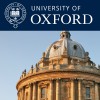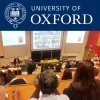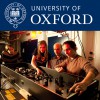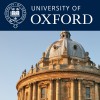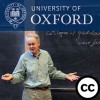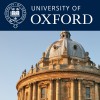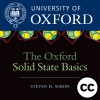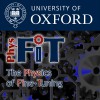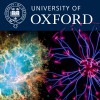Department of Physics

Relevant Links
Physics at Oxford aspire to be one of the best physics departments in the world by conducting cutting-edge research and by teaching and developing the careers of the next generation of physicists.
Physics work on major facilities worldwide, develop the most advanced experimental techniques and the most sophisticated theoretical methods to investigate nature at every scale.
Oxford University Physics Department pursues fundamental science and in doing so make discoveries that enable them to contribute directly to tackling the challenging problems facing society.
Series associated with Department of Physics
| # | Episode Title | Description | People | Date | |
|---|---|---|---|---|---|
| 422 | Creative Commons | A New Twist on Topology: The Rise of “Moiré Materials” | Prof Sid Parameswaran discusses how quantum condensed matter physics has been revolutionized by “moiré materials”, made by stacking individual atomically thin layers such as graphene with a relative twist/offset between layers. | Siddharth Parameswaran | 21 Feb 2025 |
| 421 | Creative Commons | Anyons: New Types of Particles in Quantum Physics | While it was originally believed that only bosons and fermions were allowed by quantum mechanics, in fact, when objects are restricted to move on a two-dimensional plane, new types of particles called "anyons" can emerge. | Steve Simon | 21 Feb 2025 |
| 420 | Creative Commons | Topology in the Physics of Condensed Matter | Prof Shivaji Sondhi explains how topology is applied to understanding properties of condensed matter systems, providing an introduction to topics including defects & solitons, the quantum Hall effect, and topological insulators. | Shivaji Sondhi | 21 Feb 2025 |
| 419 | The Hubble Tension | Professor Prateek Agrawal discusses the ongoing crisis in cosmology regarding the measurement of the Hubble parameter by two separate probes in this Morning of Theoretical Physics talk from 9th November, 2024 | Prateek Agrawal | 15 Nov 2024 | |
| 418 | Cosmic strings and gravitational waves from the early Universe | Professor Edward Hardy discusses how the network of cosmic strings that occurs in some theories of the early Universe evolves and emits gravitational waves in this Morning of Theoretical Physics talk from 9th November, 2024. | Edward Hardy | 15 Nov 2024 | |
| 417 | The future of Particle Physics | Professor Daniela Bortoletto, Head of Particle Physics at University of Oxford, considers future advancements in particle physics and the ongoing quest to understand the universe's fundamental nature. | Daniela Bortoletto | 30 Jul 2024 | |
| 416 | Neutrino oscillations | Professor Paul Harrison (University of Warwick) discusses the life and work of Don Perkins, focusing on neutrino oscillations. He reminisces about meeting Perkins in 1994 and the theoretical framework they developed together. | Paul Harrison | 26 Jul 2024 | |
| 415 | Neutrinos at Soudan and proton decay | Join Professor Mark Thomson on a journey through particle physics from his early days in proton decay experiments to roles in major neutrino projects like MINOS and DUNE, and the profound implications of particle physics research. | Mark Thomson | 26 Jul 2024 | |
| 414 | Cosmic Rays / Dark Matter | Professor Jocelyn Monroe (Particle Physics, University of Oxford) discusses cosmic rays, dark matter, and the work of Don Perkins, focusing on the tools of particle astrophysics. | Jocelyn Monroe | 26 Jul 2024 | |
| 413 | Don Perkins and Neutral Currents | Professor Deiter Haidt, Don Perkin's collaborator on the Gargamelle project at CERN, details the seminal contributions of Don Perkins to neutrino physics and the Standard Model. | Dieter Haidt | 19 Jul 2024 | |
| 412 | Don Perkins and Charged Currents | Professor Chris Llewelyn-Smith provides a detailed account of Don Perkins' contributions to particle physics, his role as a leading figure, and his impact on the field through his work on neutrino interactions and particle physics. | Chris Llewelyn-Smith | 19 Jul 2024 | |
| 411 | The early years: Bristol, Emulsions, Pion discovery | Professor Brian Foster (Experimental Physics at University of Oxford) explores the early years of Don Perkins in particle physics, his pion discovery, and his lasting impact on the field and cancer therapy. | Brian Foster | 19 Jul 2024 | |
| 410 | Chirality in living systems | Prof Alexander Mietke discusses recent findings in this field that have linked chirality in living systems to the formation of a left-right body axis in organisms and to a new kind of elasticity that is found in crystals formed by starfish embryos. | Alexander Mietke | 11 Jun 2024 | |
| 409 | Imaging living systems | Dr Adrien Hallou presents a new methodology called 'spatial mechano-transcriptomics', which allows the simultaneous measurement of the mechanical and transcriptional states of cells in a multicellular tissue at single cell resolution. | Adrien hallou | 11 Jun 2024 | |
| 408 | Statistical physics of living systems | Professor Julia Yeomans describes how mechanical models are being extended to incorporate the unique properties of living systems | Julia Yeomans | 11 Jun 2024 | |
| 407 | The Miracle of Quantum Error Correction | In this talk, Benedikt Placke introduces QEC and explains how the unique interplay between the classical and the quantum world enables us to efficiently correct errors effecting such systems. | Benedikt Placke | 15 Mar 2024 | |
| 406 | Simulating physics beyond computer power | In this talk Alessio Lerose discusses the seminal idea of simulating Nature via a controllable quantum system rather than a classical computer. He discusses recent advances that brought us closer to the ultimate goal of a universal quantum simulator. | Alessio Lerose | 15 Mar 2024 | |
| 405 | A liquid of quarks and gluons | Jasmine Brewer covers recent progress on studying the properties of the quark-gluon plasma, and describe how we can capitalize on lessons learned from high-energy physics to provide new insights on this novel material. | Jasmine Brewer | 15 Mar 2024 | |
| 404 | Was there a strategic alternative to the atomic bombing of 1945? | Delve into history with Dr Rob Johnson, Director of The Changing Character of War Centre at Oxford, as he explores a pivotal question. | Rob Johnson | 21 Dec 2023 | |
| 403 | Oxford Physics and the ‘remote and speculative project’ | A lecture by Prof Stephen Blundell, Professor of Physics – Condensed Matter - (Department of Physics and Mansfield College). | Stephen Blundell | 21 Dec 2023 | |
| 402 | Nuclear Physics and the development of the bomb | Explore the history of atomic bomb development with Dr. Georg Viehhauser, Particle Physics Research Lecturer at St John's College, Oxford. | Georg Viehhauser | 21 Dec 2023 | |
| 401 | Possible sources for the gravitational wave background | Dr Yonadav Barry Ginat - Possible sources for the gravitational wave background | Yonadav Barry Ginat | 28 Nov 2023 | |
| 400 | Searching for the origin of black hole mergers in the Universe with gravitational waves | Prof Bence Kocsis - Searching for the origin of black hole mergers in the Universe with gravitational waves | Bence Kocsis | 28 Nov 2023 | |
| 399 | Gravitational radiation: an overview | Prof Steven Balbus - Gravitational radiation: an overview | Steven Balbus | 28 Nov 2023 | |
| 398 | How the weird and wonderful properties of magnetised laser plasmas could ignite fusion-energy research | Archie Bott explains how a promising scheme for fusion relies on a novel feature of hot laser-plasmas: introducing a magnetic field of the correct strength alters the plasma’s fundamental properties in a highly counterintuitive yet beneficial manner. | Archie Bott | 02 Jun 2023 | |
| 397 | Stellarators: twisty tokamaks that could be the future of fusion | Georgia Acton introduces stellarators, discusses the features that distinguish them from tokamaks, highlight the challenges we currently face, and discusses how we might overcome them. | Georgia Acton | 02 Jun 2023 | |
| 396 | Magnetic confinement fusion: Science that’s hotter than a Kardashian Instagram post | Michael Barnes introduces the basic concepts behind magnetic confinement fusion, he describes why it is so challenging and discusses possibilities for the future. | Michael Barnes | 02 Jun 2023 | |
| 395 | The spaghettification of stars by supermassive black holes: understanding one of nature’s most extreme events | The spaghettification of stars by supermassive black holes: understanding one of nature’s most extreme events - Andrew Mummery | Andrew Mummery | 03 Mar 2023 | |
| 394 | Extreme value statistics and the theory of rare events | Extreme value statistics and the theory of rare events - Francesco Mori | Francesco Mori | 03 Mar 2023 | |
| 393 | Inflation and the Very Early Universe | Inflation and the Very Early Universe - Georges Obied | Georges Obied | 03 Mar 2023 | |
| 392 | Axion Searches from Black Holes to the Basement | Professor John March-Russell talks about the search possibilities for axions including many current and near future ultra-precise quantum `table top' experiments in the Beecroft basement. | John March-Russell | 01 Dec 2022 | |
| 391 | Axion Electrodynamics in Solid-State Materials | Professor Siddharth Parameswaran gives the second talk on Axions. | Siddharth Parameswaran | 01 Dec 2022 | |
| 390 | The Axion: How Angles Become Particles | Professor Joseph Conlon introduces the general idea of axions: particles associated to fields which are valued on a circle rather than a real line. | Joseph Conlon | 01 Dec 2022 | |
| 389 | Fluid-gravity duality and hydrodynamics of black holes | Holography explains why black hole horizons have thermodynamic and hydrodynamic properties and inspires researchers to re-visit foundations and explore limits of relativistic hydrodynamics | Andrei Starinets, Julia Yeomans | 29 Apr 2021 | |
| 388 | Hydrodynamics of Quantum Many-Body Systems Out of Equilibrium | Can we apply hydrodynamics to systems with extensively many conservation laws | Bruno Bertini | 29 Apr 2021 | |
| 387 | Why Hydrodynamics? | What is hydrodynamics and why does it apply over 20 orders of magnitude in energy and length. | Steve Simon, Julia Yeomans | 29 Apr 2021 | |
| 386 | Strings and Fields | Will strings be the theory of everything?, presented by Prof Luis Fernando Alday. | Luis Fernando Alday | 16 Jan 2021 | |
| 385 | Classical and Quantum Black Holes | Prof March-Russell explains our latest understanding of black holes, some of the most mysterious objects in the Universe. | John March-Russell | 16 Jan 2021 | |
| 384 | Why is Quantum Gravity so hard? | A pressing question in our quest to understand the Universe is how to unify quantum mechanics and gravity, the very small and the very large. | John Wheater | 16 Jan 2021 | |
| 383 | Machine learning techniques in modern quantum-mechanics experiments | In this talk, Dr Elliott Bentine shall discuss how recent experiments have exploited machine-learning techniques, both to optimize the operation of these devices and to interperet the data they produce. | Elliott Bentine | 22 Mar 2020 | |
| 382 | Machine Learning and String Theory | Professor Andre Lukas will discuss how string theorists have started to use methods from data science - particularly machine learning - to analyse the vast landscape of string data. | Andre Lukas | 22 Mar 2020 | |
| 381 | An Introduction to deep learning | Professor Ard Louis gives a basic introduction to deep learning for physicists and addresses a few questions such as: Is the hype around deep learning justified, or are we about to hit some fundamental limitations? | Ard Louis | 22 Mar 2020 | |
| 380 | Welcome by Ian Shipsey Head of the Department of Physics | Ian Shipsey give an update on the department and introduces the next three talk on 'AI in Physics'. | Ian Shipsey | 22 Mar 2020 | |
| 379 | IceCube: Opening a New Window on the Universe from the South Pole | Particle Physics Christmas Lecture, hosted by Prof. Daniela Bortoletto, Head of Particle Physics and senior members of the department with guest speaker, Professor Francis Halzen. | Daniela Bortoletto, Francis Halzen | 20 Dec 2019 | |
| 378 | The First Image of a Black Hole | Professor Heino Falcke of Radboud University, Nijmegen delivers the 19th Hintze Lecture - reviewing the latest results of the Event Horizon Telescope, its scientific implications and future expansions of the array | Heino Falcke | 19 Nov 2019 | |
| 377 | Cosmic acceleration revealed by Type la supernovae? | In this talk Subir Sarkar will explain how deflagration supernovae have been used to infer that the Hubble expansion rate is accelerating, and critically assess whether the acceleration is real and due to `dark energy’. | Subir Sarkar | 01 Nov 2019 | |
| 376 | Supernova Explosions and their Role in the Universe | In this talk, Philipp Podsiadlowski will explain how this energy (sometimes) creates a visible fireball, before going on to explain the role of supernovae in the production of the heaviest elements in the periodic table. | Philipp Podsiadlowski | 01 Nov 2019 | |
| 375 | What makes stars go bang? | In this talk, James Binney will outline the physics that leads to prodigeous release of energy in core-collapse and deflagration supernovae. | James Binney | 01 Nov 2019 | |
| 374 | Creative Commons | The Many Universes of Quantum Materials | Professor Stephen Blundell explores the many universes of quantum materials for the 2019 Quantum Materials Public Lecture. | Stephen Blundell | 07 Oct 2019 |
| 373 | Gravitational Waves and Prospects for Multi-messenger Astronomy | Professor Barry C Barish gives a talk on the quest for the detection of gravitational waves. | Barry C. Barrish | 30 Jul 2019 | |
| 372 | Finding aliens – An update on the search for life in the Universe | Bill Diamond, President & CEO The SETI Institute gives an an update on the search for life in the Universe. Hosted by Ian Shipsey, Head of Physics. | Bill Diamond, Ian Shipsey | 30 Jul 2019 | |
| 371 | Cherwell-Simon Memorial Lecture: The XENON Project: at the forefront of Dark Matter Direct Detection | What is the Dark Matter which makes 85% of the matter in the Universe? We have been asking this question for many decades and used a variety of experimental approaches to address it, with detectors on Earth and in space. | Elena Aprile | 08 Jul 2019 | |
| 370 | Is Dark Matter Made of Black Holes | The 2019 Halley lecture | Marc Kamionkowski | 04 Jun 2019 | |
| 369 | The Role of Gas in Galaxy Evolution | Professor Jacqueline van Gorkom delivers the 18th Hintze Lecture. | Jacqueline van Gorkom | 03 Jun 2019 | |
| 368 | ... from collisions to the Higgs boson | To study the Higgs boson at the LHC we also need to understand how highly energetic quarks and gluons interact, among themselves and with the Higgs. | Fabrizio Caola | 16 May 2019 | |
| 367 | From protons to collisions… | We learn about the Higgs Boson and its interactions at the LHC by examining the debris produced by colliding protons head-on at unprecedented high energies. | Lucian Harland-Lang | 16 May 2019 | |
| 366 | What the Large Hadron Collider is telling us about the Higgs sector and its new interactions | Over the past two years, CERN’s Large Hadron Collider (LHC) has started to directly probe a qualitatively new class of interactions, associated with the Higgs boson. | Gavin Salam | 16 May 2019 | |
| 365 | The oldest light in the Universe | In this short stargazing talk, Luke Jew looks at the topic - The oldest light in the Universe. | Luke Jew | 05 Apr 2019 | |
| 364 | The brief history of the Universe | Sergio Martin describes the evolution of the Universe. | Sergio Martin | 22 Mar 2019 | |
| 363 | Electron Paramagnetic Resonance - Past, Present and Future | Professor Mark Newton describes some of the key events in the discovery and development of Electron Paramagnetic Resonance (EPR). | Mark Newton | 18 Mar 2019 | |
| 362 | Creative Commons | All the dark we cannot see - the state of the art in direct searches for particle dark matter | Professor Laura Baudis, University of Zurich, discusses the nature of dark matter. | Laura Baudis | 18 Mar 2019 |
| 361 | Why the world is simple - Prof Ard Louis | The coding theorem from algorithmic information theory (AIT) - which should be much more widely taught in Physics! - suggests that many processes in nature may be highly biased towards simple outputs. | Ard Louis | 15 Feb 2019 | |
| 360 | Topology in Biology - Prof Julia Yeomans FRS | Active systems, from cells and bacteria to flocks of birds, harvest chemical energy which they use to move and to control the complex processes needed for life. | Julia Yeomans | 15 Feb 2019 | |
| 359 | Welcome from the Head of the Physics Department | Ian Shipsey delivers the welcome speech for the Saturday Mornings of Theoretical Physics. | Ian Shipsey | 15 Feb 2019 | |
| 358 | Entropy from Entanglement | Siddharth Parameswaran, Associate Professor, Physics Department. | Siddharth Parameswaran | 03 Dec 2018 | |
| 357 | Entropy: two short stories | John Chalker, Head of Theoretical Physics, gives a talk on entropy. | John Chalker | 03 Dec 2018 | |
| 356 | Entropy: Gaining Knowledge by Admitting Ignorance | Alexander Schekochihin, Professor of Theoretical Physics, gives a talk on entropy. | Alexander Schekochihin | 03 Dec 2018 | |
| 355 | The Quantum and the Cosmos | The 17th Hintze Lecture, given by Professor Rocky Kolb, Arthur Holly Compton Distinguished Service Professor of Astronomy and Astrophysics, The University of Chicago. | Rocky Kolb | 14 Nov 2018 | |
| 354 | The Search for Life on Earth, In Space and Time | Dr James Green, current Chief Scientist of NASA gives a talk on the how life may be distributed on Earth and in the Solar System with consideration of the age of our sun. | James Green | 29 Oct 2018 | |
| 353 | Networked Quantum Information Technologies | This talk reviews the developments in quantum information processing. | Dominic O'Brien | 06 Jul 2018 | |
| 352 | Quantum logic with trapped-ion qubits | This talk reviews testing and developing ideas in quantum computing using laser-manipulated trapped ions. | David Lucas | 06 Jul 2018 | |
| 351 | The ultimate limits of privacy and randomness...for the paranoid ones | This talk explains how qubits are used to represent numbers in a way that permits 'quantum-mechanical parallel' computing. | Artur Ekert | 06 Jul 2018 | |
| 350 | “Open” Quantum Systems | This talk reviews how to deal with quantum systems that are coupled to the outside world, as in reality all systems are. | Fabian Essler | 06 Jul 2018 | |
| 349 | Quantum Systems from Group up | This talk reviews the modern formulation of the basic ideas of quantum mechanics. | James Binney | 06 Jul 2018 | |
| 348 | How do we find planets around other stars? | The 3rd Wetton lecture, 19th June 2018 delivered by Professor David W. Hogg, Center for Cosmology and Particle Physics, New York University | David W Hogg | 02 Jul 2018 | |
| 347 | Creative Commons | The Quest for Nearby Habitable Worlds | The 16th Hintze lecture, 25th April 2018 delivered by Professor René Doyon, Director, Mont-Mégantic Observatory & Institute for Research on Exoplanets, University of Montreal, Canada | Rene Doyon | 22 May 2018 |
| 346 | Fine-Tuning Discussion | Simon Friederich, Natalja Deng, and Erik Curiel participate in a roundtable discussion addressing questions around probability, fine-tuning, and arguments for a multiverse or deity. | Simon Friederich, Natalja Deng, Erik Curiel | 24 Apr 2018 | |
| 345 | Erik Curiel: Measure, Topology, and Probability in Cosmology. | Erik Curiel explains the challenges in making assessments of probability by making assumptions about the space of universes--or cosmological models--that our theories allow. | Erik Curiel | 24 Apr 2018 | |
| 344 | Natalja Deng: What Kind of Fine-Tuner? | Natalja Deng discusses whether the apparent fine-tuning of the universe for life can be evidence for a divine creator. | Natalja Deng | 24 Apr 2018 | |
| 343 | Simon Friederich: Fine-Tuning for Life in the Universe, A Panoramic View | Simon Friederich reviews the challenges that arise in using empirical evidence that the universe is tuned for life to evaluate multiverse hypothesis. | Simon Friederich | 24 Apr 2018 | |
| 342 | Evidence in the Multiverse | Erik Curiel and Simon Friederich hash out the problems we encounter when we look for evidence of a multiverse. | Erik Curiel, Simon Friederich | 24 Apr 2018 | |
| 341 | The Hard Fact of Life in Big Physics City | How similar is the fine-tuning of our universe to probabilistic reasoning we use and understand? Simon Friederich and Erik Curiel go through a series of examples. | Erik Curiel, Simon Friederich | 24 Apr 2018 | |
| 340 | Stability and Probability | Erik Curiel and Simon Friederich discuss how reasoning in cosmology sometimes conflates topological stability with probability, and why that might be wrong. | Simon Friederich, Erik Curiel | 24 Apr 2018 | |
| 339 | Problems with Probability | Simon Friederich and Erik Curiel discuss the problems fine-tuning arguments raise for our understanding of probability. | Simon Friederich, Erik Curiel | 24 Apr 2018 | |
| 338 | ALMA and the Birth of Stars Across Galaxies | The 2018 Astor Visiting Lecture 14th March 2018 delivered by Professor Adam Leroy, Ohio State University. | Adam Leroy | 28 Mar 2018 | |
| 337 | Rushing Robots and Tons of Glass: Building the WEAVE Spectrograph | Ellen Schallig gives a short talk on building the WEAVE spectograph. | Ellen Schallig | 21 Feb 2018 | |
| 336 | Quasars: Are They As Cool As They Sound? | In this flash talk, Josie Peters presents on the topic of quasars. | Josie Peters | 21 Feb 2018 | |
| 335 | The Big Bang and a Multiverse | Darsh Kodwani gives a short talk on The Big bang and a multiverse. | Darsh Kodwani | 21 Feb 2018 | |
| 334 | I'm Spinning Around: Watching Galaxies Rotate (Or Not) | Mark Graham gives a short talk on the rotation of galaxies. | Mark Graham | 21 Feb 2018 | |
| 333 | It's a Star's Life | In this short talk, Rebecca Esselstein gives an overview of a typical star's lifespan. | Rebecca Esselstein | 21 Feb 2018 | |
| 332 | Galactic Archaeology: Mining Stellar Fossils in the Milky Way Halo | Payel Das gives a short talk on mining stellar fossils in the Milky Way halo. | Payel Das | 21 Feb 2018 | |
| 331 | Weighing Black Holes | Oxford astrophysicist Martin Bureau gives a talk on black holes. | Martin Bureau | 21 Feb 2018 | |
| 330 | Taking Real Photos of Planets Outside the Solar System | Jean-Loup Baudino gives a short talk on planets outside the solar system. | Jean-Loup Baudino | 21 Feb 2018 | |
| 329 | Merging Galaxies: Making the Biggest Mess! | Nathan Adams presents a short talk on merging galaxies. | Natham Adams | 21 Feb 2018 | |
| 328 | Galaxy Dynamics: The chemical evolution side | Dr Ralph Schoenrich will talk about the chemical evolution side | Ralph Schoenrich | 25 Jan 2018 | |
| 327 | Galaxy Dynamics: The dynamics of galaxy discs | Dr John Magorrian will talk about the dynamics of galaxy discs | John Magorrian | 25 Jan 2018 | |
| 326 | Galaxy Dynamics: Stellar systems: a new state of matter | Prof James Binney FRS will talk about stellar systems: a new state of matter | James Binney | 25 Jan 2018 | |
| 325 | The State of the Universe | Our Universe was created in 'The Big Bang' and has been expanding ever since. Professor Schmidt describes the vital statistics of the Universe, and tries to make sense of the Universe's past, present, and future. | Brian Schmidt | 20 Nov 2017 | |
| 324 | Superfluids in Flatland: Topology, Defects, and the 2016 Nobel Prize | In this talk, Siddharth Parameswaran discusses how a topological approach to 2D systems reveal that they can indeed become superfluid, and lead to surprising and beautiful universal results whose implications continue to resonate today. | Siddharth Parameswaran | 03 Nov 2017 | |
| 323 | Quantum mechanics on the human scale | Stephen Blundell reviews a theory of superconductivity that was developed in Oxford in the 1930’s by Fritz London. | Stephen Blundell | 03 Nov 2017 |
- 1 of 5
- next ›

